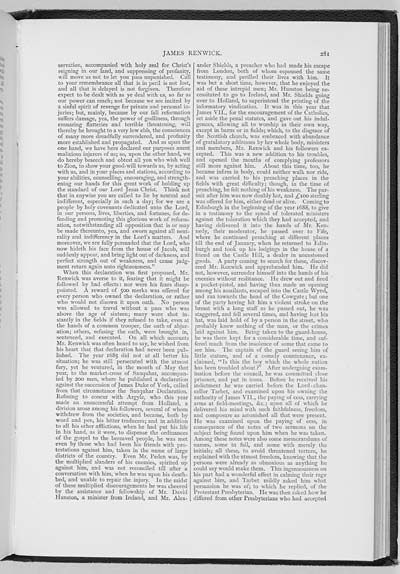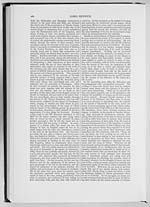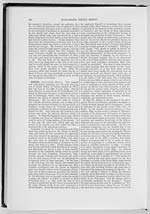281
servation, accompanied with, holy zeal for Christ's
reigning in our land, and suppressing of profanity,
will move us not to let you pass unpunished. Call
to your remembrance all that is in peril is not lost,
and all that is delayed is not forgiven. Therefore
expect to be dealt with as ye deal with us, so far as
our power can reach; not because we are incited by
a sinful spirit of revenge for private and personal in-
juries; but, mainly, because by our fall reformation
suffers damage, yea, the power of godliness, through
ensnaring flatteries and terrible threatening, will
thereby be brought to a very low ebb, the consciences
of many more dreadfully surrendered, and profanity
more established and propagated. And as upon the
one hand, we have here declared our purposes anent
malicious injurers of us; so, upon the other hand, we
do hereby beseech and obtest all you who wish well
to Zion, to show your good-will towards us, by acting
with us, and in your places and stations, according to
your abilities, counselling, encouraging, and strength-
ening our hands for this great work of holding up
the standard of our Lord Jesus Christ. Think not
that in anywise you are called to lie by neutral and
indifferent, especially in such a day; for we are a
people by holy covenants dedicated unto the Lord,
in our persons, lives, liberties, and fortunes, for de-
fending and promoting this glorious work of reform-
ation, notwithstanding all opposition that is or may
be made thereunto, yea, and sworn against all neut-
rality and indifferency in the Lord's matters. And
moreover, we are fully persuaded that the Lord, who
now hideth his face from the house of Jacob, will
suddenly appear, and bring light out of darkness, and
perfect strength out of weakness, and cause judg-
ment return again unto righteousness."
When this declaration was first proposed, Mr.
Renwick was averse to it, fearing that it might be
followed by bad effects: nor were his fears disap-
pointed. A reward of 500 merks was offered for
every person who owned the declaration, or rather
who would not disown it upon oath. No person
was allowed to travel without a pass who was
above the age of sixteen; many were shot in-
stantly in the fields if they refused to take, even at
the hands of a common trooper, the oath of abjur-
ation; others, refusing the oath, were brought in,
sentenced, and executed. On all which accounts
Mr. Renwick was often heard to say, he wished from
his heart that that declaration had never been pub-
lished. The year 1685 did not at all better his
situation; he was still persecuted with the utmost
fury, yet he ventured, in the month of May that
year, to the market-cross of Sanquhar, accompan-
ied by 200 men, where he published a declaration
�against the succession of James Duke of York, called
from that circumstance the Sanquhar Declaration.
Refusing to concur with Argyle, who this year
made an unsuccessful attempt from Holland, a
division arose among his followers, several of whom
withdrew from the societies, and became, both by
word and pen, his bitter traducers; and in addition
to all his other afflictions, when he had put his life
in his hand, as it were, to dispense the ordinances
of the gospel to the bereaved people, he was met
even by those who had been his friends with pro-
testations against him, taken in the name of large
districts of the country. Even Mr. Peden was, by
the multiplied slanders of his enemies, spirited up
against him, and was not reconciled till after a
conversation with him, when he was upon his death-
bed, and unable to repair the injury. In the midst
of these multiplied discouragements he was cheered
by the assistance and fellowship of Mr. David
Hunston, a minister from Ireland, and Mr. Alex-
ander Shields, a preacher who had made his escape
from London, both of whom espoused the same
testimony, and perilled their lives with him. It
was but a short time, however, that he enjoyed the
aid of these intrepid men; Mr. Hunston being ne-
cessitated to go to Ireland, and Mr. Shields going
over to Holland, to superintend the printing of the
informatory vindication. It was in this year that
James VII., for the encouragement of the Catholics,
set aside the penal statutes, and gave out his indul-
gences, allowing all to worship in their own way,
except in barns or in fields; which, to the disgrace of
the Scottish church, was embraced with abundance
of gratulatory addresses by her whole body, ministers
and members, Mr. Renwick and his followers ex-
cepted. This was a new addition to his troubles,
and opened the mouths of complying professors
still more against him. About this time, too, he
became infirm in body, could neither walk nor ride,
and was carried to his preaching places in the
fields with great difficulty; though, in the time of
preaching, he felt nothing of his weakness. The pur-
suit after him was now doubly hot, and �100 sterling
was offered for him, either dead or alive. Coming to
Edinburgh in the beginning of the year 1688, to give
in a testimony to the synod of tolerated ministers
against the toleration which they had accepted, and
having delivered it into the hands of Mr. Ken-
nedy, their moderator, he passed over to Fife,
where he continued preaching at different places
till the end of January, when he returned to Edin-
burgh and took up his lodgings in the house of a
friend on the Castle Hill, a dealer in uncustomed
goods. A party coming to search for these, discov-
ered Mr. Renwick and apprehended him. He did
not, however, surrender himself into the hands of his
enemies without resistance. He drew out and fired
a pocket-pistol, and having thus made an opening
among his assailants, escaped into the Castle Wynd,
and ran towards the head of the Cowgate; but one
of the party having hit him a violent stroke on the
breast with a long staff as he passed out, he was
staggered, and fell several times, and having lost his
hat, was laid hold of by a person in the street, who
probably knew nothing of the man, or the crimes
laid against him. Being taken to the guard-house,
he was there kept for a considerable time, and suf-
fered much from the insolence of some that came to
see him. The captain of the guard seeing him of
little stature, and of a comely countenance, ex-
claimed, "Is this the boy which the whole nation
has been troubled about ?" After undergoing exam-
ination before the council, he was committed close
prisoner, and put in irons. Before he received his
indictment he was carried before the Lord-chan-
cellor Tarbet, and examined upon his owning the
authority of James VII., the paying of cess, carrying
arms at field-meetings, &c.; upon all of which he
delivered his mind with such faithfulness, freedom,
and composure as astonished all that were present.
He was examined upon the paying of cess, in
consequence of the notes of two sermons on the
subject being found upon him when he was taken.
Among these notes were also some memorandums of
names, some in full, and some with merely the
initials; all these, to avoid threatened torture, he
explained with the utmost freedom, knowing that the
persons were already as obnoxious as anything he
could say would make them. This ingenuousness on
his part had a wonderful effect in calming their rage
against him, and Tarbet mildly asked him what
persuasion he was of; to which he replied, of the
Protestant Presbyterian. He was then asked how he
differed from other Presbyterians who had accepted

![]() Universal Viewer |
Universal Viewer | ![]() Mirador |
Large image | Transcription
Mirador |
Large image | Transcription
![]()

